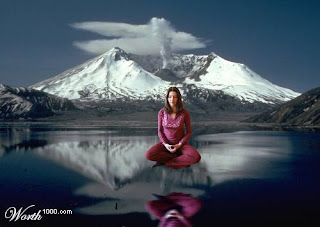 A friend and colleague of mine who is a reader of this blog sent me an email recently with some thoughts in response to my last post on “Occult-Tinged Television.” Since my friend sent this email to me privately in that he is working out his thoughts on this topic, I won’t mention his name, but his email has me thinking. I’d like to post some thoughts here for my readers consideration.
A friend and colleague of mine who is a reader of this blog sent me an email recently with some thoughts in response to my last post on “Occult-Tinged Television.” Since my friend sent this email to me privately in that he is working out his thoughts on this topic, I won’t mention his name, but his email has me thinking. I’d like to post some thoughts here for my readers consideration.
The substance of my friend’s email was to question whether the category of “occult-tinged” fiction is useful. He wondered whether such a broad label that includes programs like Heroes might also be so broad as to include Middle Earth, Narnia, Aladdin, and A Christmas Carol if such stories include elements, events, and people that engage in practices that violate the laws of physics or include practices that go beyond our normal perceptions of reality and thereby fold over into what some might label “the occult.”
As my friend’s email continued he wondered whether science fiction would be viewed as “occult-tinged” in that it frequently includes elements of the fantastic which in one context would be labeled fantasy, and in another “the occult,” but in science fiction such elements are given a veneer of technological plausibility through scientific sounding labels. This happened frequently in the Star Trek franchise where various forms of “techno babble” were invoked to not only rescue the Enterprise from whatever threat, but also to make the fantastic possible and believable for a scientific and rationally informed audience.
I remember several years ago when I was on a panel discussion on the Potter books at an evangelical conference on new religions how most were up in arms over the alleged occult in Potter. This seemed strange to me in that the fantasy magic I saw there seemed like a variation of the fantasy magic I enjoyed as a child (and still enjoy) in things like Ray Harryhausen’s films which frequently drew upon ancient myths.
My friend wonders why in one context when someone or something levitates, in a Harry Potter story for instance, some are quick to label this “occultic.” But if something similar were to take place, such as the levitation of Luke Skywalker’s speeder in Star Wars IV, this is understood as either fantasy, or with a television program I saw recently on the “Technology of Star Wars,” attempts are made to see how such things might be scientifically possible, or at least hope is held out that it might be so in the future. But no one is sounding alarm bells over 30 years of occult-tinged cinema through George Lucas.
I appreciate my friends thinking, and as a result, I want to make a few clarifications to my previous post related to this topic.
First, my previous post dealt with a post on another blog that picked up on a story from The New York Times on what it considered occult influenced television. My intention with the post was to draw attention to the story, to note that some aspects of popular culture are influenced by genuine esotericism and various forms of alternative spiritualities, and that this is significant in our understanding of popular culture and religious studies.
Second, what the Times failed to do, and what I probably should have done, was to make an important distinction between genuine occult- or esotericism-tinged television, and other expressions of the magical or the fantastic in various forms of fiction that are not accurately understood as representing esotericism and which are frequently mislabeled as such, especially in conservative evangelical Christianity.
Third, I hope my readers find some value in this issue, and I’d like to get some thoughtful feedback from you on this. Such a discussion will be especially helpful in light of the pending release of the last Harry Potter book and the latest film that I understand is about to be released. Perhaps some level-headed discussion here can contribute to a more reflective evangelical perspective on Potter and all things fantastic.





A lot probably depends on how one defines “occult”. I think many US evangeliscals define it as “something I don’t like”.
I am especially puzzled by the term “‘the’ occult”, what is the “the” there for?
As far as I can see, “occult” means “hidden”, and those who talk about “the” occult are occultists because they are trying to obscure their meaning by using vague and meanilngless terminilogy. In other words, those who witter on about “the” occult are p[eddling bullshit, plain and simple, whether they are for it or agin it.
A lot probably depends on how one defines “occult”. I think many US evangeliscals define it as “something I don’t like”.
I am especially puzzled by the term “‘the’ occult”, what is the “the” there for?
As far as I can see, “occult” means “hidden”, and those who talk about “the” occult are occultists because they are trying to obscure their meaning by using vague and meanilngless terminilogy. In other words, those who witter on about “the” occult are p[eddling bullshit, plain and simple, whether they are for it or agin it.